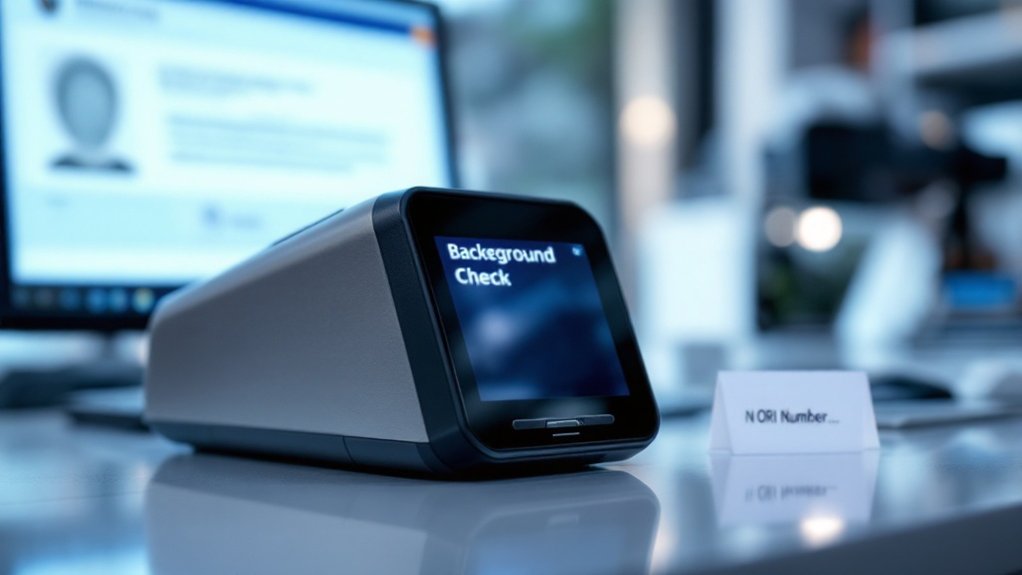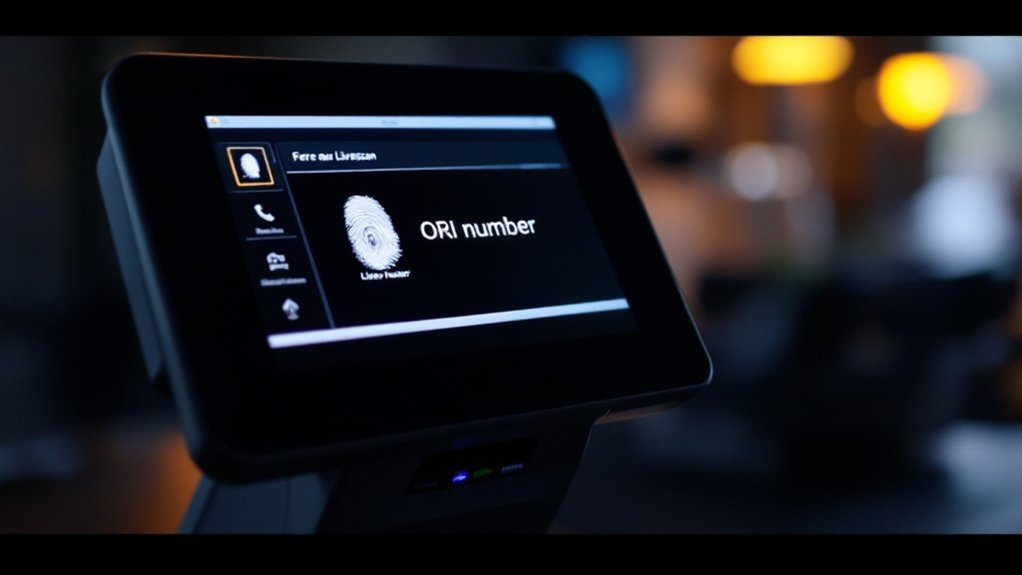When you undergo live scan fingerprinting, you must provide a mandatory Originating Agency Identifier (ORI) number. This nine-character code guarantees your fingerprint results are sent to the appropriate agency, preserving confidentiality and compliance. In states like Florida, ORI numbers are indispensable for routing background check results precisely. You’ll need to verify the ORI number to avoid delays. By comprehending ORI numbers, you can navigate the process more efficiently and ascertain accurate results delivery.
Understanding ORI Numbers

Understanding ORI numbers is paramount for anyone involved in Live Scan fingerprinting or law enforcement processes. An ORI, or Originating Agency Identifier, is a unique code assigned by the FBI or DOJ to authorized agencies. Typically, it’s a nine-character identifier that identifies agencies in transactions on systems like the National Crime Information Center (NCIC). This guarantees that fingerprinting results are sent to the correct agency, maintaining confidentiality and regulatory compliance.
As you navigate these processes, remember that ORIs are indispensable for routing background check results accurately. Incorrect ORIs can lead to delays and misrouting, so verifying them is essential. Additionally, ORIs are assigned based on established qualifying criteria, ensuring that only authorized agencies can access and submit information, such as fingerprinting services.
Purpose and Usage of ORI Numbers
When you’re involved in Live Scan fingerprinting, understanding the purpose and usage of ORI numbers is vital. You’ll use these numbers to identify the authorized agency requesting your background check results, making certain they’re sent to the correct destination and processed according to relevant statutes. By providing the correct ORI number, you ascertain accurate processing, maintain the confidentiality of your records, and avoid delays or misrouting that could impact your applications or licenses. Additionally, a Level 2 Background Check must include a valid ORI number to ensure that the results are processed correctly and sent to the appropriate agency.
Purpose and Usage of ORI Numbers
As you undergo a Level 2 Background Check, the ORI number plays an essential role in guaranteeing that your background check results are processed accurately and delivered to the correct agency. It serves as a routing identifier, informing the FBI and FDLE about relevant statutes and offenses to scrutinize. The ORI number is mandatory for Level 2 checks and is typically provided during the application process for licenses or employment. Employers must furnish this number for job applicants, and it’s also required for court-related matters.
You’ll use the ORI number to confirm compliance with regulatory requirements and avoid delays or misrouting of results. Incorrect numbers can lead to additional costs for reprocessing, so it’s vital to verify them accurately.
Agency Identification
In the context of Live Scan fingerprinting, an ORI number serves as a vital identifier for agencies requesting background checks. It stands for Originating Agency Identifier, a unique code assigned to authorized agencies by the DOJ. Each agency must have an ORI before submitting applicants’ fingerprints. This identifier guarantees that results are sent to the correct agency, making it essential for accurate processing.
You’ll notice that ORIs are structured as nine-character codes, often starting with state or country identifiers, followed by county or agency acronyms, and ending with agency-specific numbers. Using the correct ORI is pivotal to avoid delays or misrouting of results, which can impact job or license applications.
Background Checks
ORI numbers play a pivotal role in background checks by identifying the agency requesting the check and confirming that results are sent to the correct destination. They are mandatory for Level 2 Background Checks, which involve fingerprinting and are used for sensitive positions. These checks are more all-encompassing than Level 1 checks and require Live Scan fingerprinting. Guaranteeing the correct ORI number is indispensable for receiving accurate and prompt results.
When undergoing a background check, you will typically receive the ORI number from the agency or employer requesting it. This number helps comply with legal requirements by directing results to the appropriate state agency. It is critical to verify the ORI number with the requesting agency to ensure accuracy. Additionally, knowing that an ORI number is a 9-digit code ensures that it is correctly formatted and recognized by the relevant authorities.
State-Specific ORI Requirements

When you’re undergoing live scan fingerprinting, you’ll need to provide a specific set of details to guarantee your background check is processed correctly. In Florida, an ORI number is mandatory for live scan fingerprinting. This number identifies the agency that should receive the background check results, ensuring proper registration and application. ORI numbers typically consist of a combination of letters and numbers, often starting with the agency’s abbreviation, such as EAHCA020Z for AHCA.
You’ll use these numbers for various professions requiring background checks, like healthcare and childcare. Providing the correct ORI number is pivotal for regulatory compliance and successful processing. Each state has its own regulations, so it’s important to follow Florida’s specific requirements to avoid delays. Additionally, Florida law requires the inclusion of an ORI number when getting fingerprints scanned to ensure that the results are routed to the correct state department, such as the Department of Law Enforcement.
Application Process for ORI Numbers
To obtain an ORI number for live scan fingerprinting, you’ll need to initiate the application process through the relevant state agency. This involves contacting your state’s Department of Justice or CJIS Systems Officer to begin. You must provide required documentation, including statutory authority, budget details, and unit functions. Applications can be submitted via email or through specific state websites.
Once submitted, it typically takes 4-6 weeks for an ORI to be assigned. You should specify whether the application is for employment, licenses, or volunteers. For California, you can contact the DOJ at (916) 227-7332 if you haven’t received your ORI within the expected timeframe. The assigned ORI is essential for accurate Live Scan processing. In California, the application process is facilitated through the DOJ website, where you can find detailed instructions and guidance on how to apply for an ORI.
Benefits and Challenges of ORI Numbers

As you navigate the process of Live Scan fingerprinting, understanding the benefits and challenges of ORI numbers is vital. You’ll find that ORI numbers enhance efficiency by enabling accurate data routing and compliance with regulations, while also maintaining security and privacy by limiting access to authorized agencies. However, you may encounter challenges such as complexity in obtaining an ORI, potential errors leading to delays, and the need for ongoing maintenance and training to permit proper use.
Efficiency Benefits
The use of ORI numbers in live scan fingerprinting considerably enhances the efficiency of the process by guaranteeing that background check results are delivered directly to the correct agency. This streamlines the process, reducing errors and miscommunication. You benefit from faster results, as ORI numbers facilitate quick delivery to the appropriate agency. Additionally, they ensure compliance with regulations, which is pivotal for maintaining order and trust in the system. The integration of electronic submission in live scan fingerprinting further supports this efficiency by allowing for rapid transmission of fingerprints to agencies like the FBI, thereby speeding up the background check process.
Security Measures
Building on the efficiency benefits of ORI numbers in live scan fingerprinting, you’ll find that these identifiers also play a significant role in bolstering security measures. ORI numbers serve as unique identifiers, guaranteeing that only authorized agencies can access sensitive information, maintaining data integrity, and controlling access to criminal history records. They facilitate audit trails, allowing for the tracking of who accessed what information, and confirm regulatory compliance. Additionally, the use of ORI numbers ensures that background checks are processed correctly, as they inform the FBI and FDLE about the relevant statutes and offenses to scrutinize, which is crucial for maintaining the integrity of the background check process.
However, implementing ORI numbers can be complex and costly, requiring administrative effort and training. Technical issues may arise, and staying updated with regulatory changes is essential. Despite these challenges, ORI numbers reduce fraud, enhance accountability, and improve data security, providing transparency in the background check process.
Compliance Issues**
When implementing ORI numbers in live scan fingerprinting, you’ll encounter both benefits and challenges. The benefits include efficient processing, accurate routing of results, cost savings, and compliance with regulations, which streamline operations and enhance productivity. However, challenges arise from incorrect information, additional costs due to resubmissions, complexity in verification, and dependence on agency communication. These issues can lead to delays and misinterpretation, complicating the application process. Guaranteeing accurate ORI numbers is vital to avoid these challenges and maintain legal integrity. By understanding these aspects, you can better navigate the compliance landscape and guarantee smooth operations. Ensuring compliance with updated policies, such as those involving research misconduct, is crucial for maintaining integrity in regulated environments.
Common Agencies Requiring Live Scan Services**
Live Scan fingerprinting is widely required by various agencies and organizations for employment background checks, professional licensing, volunteer work, certifications, and permits. You’ll need Live Scan for jobs like healthcare professionals, teachers, law enforcement personnel, and government employees. It’s also required for licensing in fields such as real estate, law, and contracting. Foster and childcare providers must undergo Live Scan as well. Volunteer roles, especially those involving vulnerable populations, often require it. Additionally, Live Scan is necessary for certifications like firearm permits and notary public applications, as well as adoption and immigration processes. Many organizations, including those in healthcare, require Live Scan to ensure compliance with state and federal regulations, enhancing the safety and reliability of their workforce.
Conclusion
As you navigate the world of Live Scan fingerprinting, understanding ORI numbers is vital. These identifiers are mandatory for accessing California’s background check system. But what happens if you don’t have one? Can you imagine the delays and inefficiencies without this essential tool? The ORI number streamlines the process, ensuring that agencies can efficiently conduct background checks. It’s a small code with a big impact.

